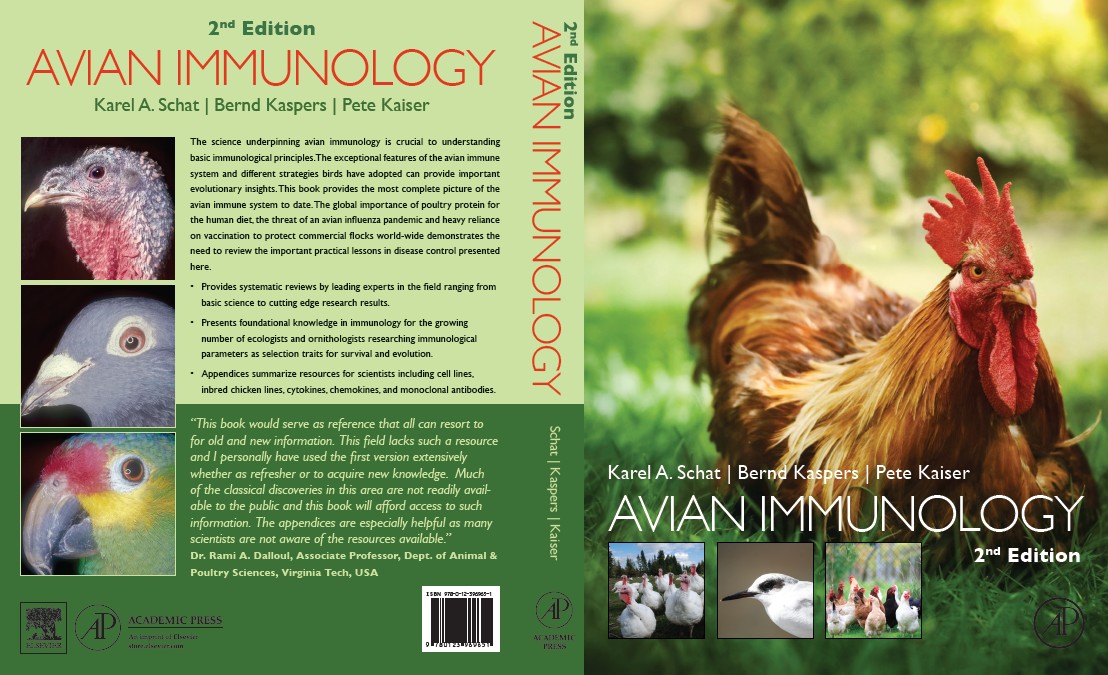Dr. Karel A.Schat launches a new edition of his book about avian immunology
Published: July 24, 2013
By: Engormix
Karel A. (Ton) Schat, DVM, Phd, Professor of Avian Virology and Immunology at the Department of Microbiology and Immunology, Cornell University, launches a new edition of the book Avian Immunology, which will be published in August by Elsevier.
 Professor Emeritus K.A. (Ton) Schat received his veterinary degree from the University of Utrecht, The Netherlands in 1970 and his PhD degree in Virology from Cornell University, Ithaca, NY in 1978. He joined the faculty at the College of Veterinary Medicine, Cornell University in 1978, where he remained until his retirement in 2011. His research focused on the immunology and pathogenesis of viral diseases of poultry, especially Marek’s disease and chicken infectious anemia. He has published over 170 papers in peer-reviewed journals and more than 30 book chapters. His contributions to avian disease research were recognized with the Upjohn Achievement Award of the AAAP in1986, the Dr. Bart Rispens Research Award of the WVPA in 1987, the Pfizer Award for Excellence in Poultry Research of the AVMA in 1999, and the Merck Award for Achievement in Poultry Science of the PSA in 2005. In 2010 he was recognized by his peers with a special award for outstanding research in the field of Marek’s disease. He is a founding member of the Hall of Honour of the World Veterinary Poultry Association.
Professor Emeritus K.A. (Ton) Schat received his veterinary degree from the University of Utrecht, The Netherlands in 1970 and his PhD degree in Virology from Cornell University, Ithaca, NY in 1978. He joined the faculty at the College of Veterinary Medicine, Cornell University in 1978, where he remained until his retirement in 2011. His research focused on the immunology and pathogenesis of viral diseases of poultry, especially Marek’s disease and chicken infectious anemia. He has published over 170 papers in peer-reviewed journals and more than 30 book chapters. His contributions to avian disease research were recognized with the Upjohn Achievement Award of the AAAP in1986, the Dr. Bart Rispens Research Award of the WVPA in 1987, the Pfizer Award for Excellence in Poultry Research of the AVMA in 1999, and the Merck Award for Achievement in Poultry Science of the PSA in 2005. In 2010 he was recognized by his peers with a special award for outstanding research in the field of Marek’s disease. He is a founding member of the Hall of Honour of the World Veterinary Poultry Association.The first edition of this book was published in 2008. Why have you decided to write this new edition?
The first edition was a huge success and sold out. As a consequence Elsevier asked the editors of the first edition if they were interested in editing the second edition. Dr. Fred Davison, lead editor of the first edition, declined the invitation because he retired too long ago. He was replaced by Professor Pete Kaiser of The Roslin Institute and R (D)SVS, University of Edinburgh and I (KAS) became the lead editor, while Professor Bernd Kaspers continued as co-editor. In addition to the fact that the first edition was sold out there has also been significant progress in new knowledge that has been incorporated in the second edition.
What segment of the population would be interested in getting a copy of the book?
This book will provide crucial information not only for poultry health professionals and avian biologists, but also for comparative and veterinary immunologists, graduate students and veterinary students with an interest in avian immunology, poultry health and ecology of free-living birds.
What changes have been made and what are the main points covered?
The second edition of Avian Immunology provides a up-to-date overview of the current knowledge of avian immunology. From the ontogeny of the avian immune system to practical applications in vaccinology, the book encompasses all aspects of innate and adaptive immunity in chickens. In addition, chapters are also devoted to the immunology of other commercially important species such as turkeys and ducks and to ecoimmunology summarizing the knowledge of immune responses in free-living birds often in relation to reproductive success.
In contrast to the first edition many of the figures are now in color.
How can people get a copy of the book?
The book will be available in electronic format as well as a printed book through Elsevier by going to the website store.elsevier.com and search for Avian immunology.
MEET THE CO-EDITORS!
 Bernd Kaspers -Department of Microbiology and Immunology, College of Veterinary Medicine, Cornell University, Ithaca, NY, USA
Bernd Kaspers -Department of Microbiology and Immunology, College of Veterinary Medicine, Cornell University, Ithaca, NY, USABernd Kaspers graduated as a veterinarian in 1986 at the University of Munich and completed his doctoral thesis (Doctor of Veterinary Medicine) in 1989. He subsequently worked as a post-doc at the United States Department of Agriculture, Agricultural Research Service, Livestock and Poultry Sciences Institute, Beltsville, MD, USA and returned to the University of Munich in 1992 where he became a full Professor for Animal Physiology in 1997. Since his dissertation he has focused on avian immuno-physiology investigating B-lymphocyte biology, cytokines and the mucosal immune system in chickens. This work included studies on a range of infection models such as avian coccidiosis, avian influenza, Marek’s Disease and Salmonella infections. His research is documented in more than 85 publications in peer-reviewed journals, several reviews and book chapters. His work is funded by grants from the German Research Foundation, the Federal Ministry of Education and Research, the European Union and through several co-operations with the poultry and vaccine industry. Bernd Kaspers is member of the German Society for Immunology and as such has been speaker of the Veterinary Immunology Study Group of the society for the last 6 years. In 2004 he hosted together with Thomas Goebel the 8th Avian Immunology Research Group Meeting in Munich with more than 120 participants.
 Professor Pete Kaiser- The Roslin Institute & R(D)SVS,University of Edinburgh, Easter Bush,Midlothian EH25 9RG,UK
Professor Pete Kaiser- The Roslin Institute & R(D)SVS,University of Edinburgh, Easter Bush,Midlothian EH25 9RG,UKProfessor Pete Kaiser is Head of the Division of Infection and Immunity and Chair in Animal Infectious Diseases at The Roslin Institute & R (D)SVS, University of Edinburgh. He is also Head of the newly established National Avian Research Facility at Roslin. He has published over 130 primary research papers and holds 3 patents, primarily in avian immunology and genetics, and is currently supported by grants from the BBSRC, EU, industry and charities. He has won competitive funding totalling over £5M since joining The Roslin Institute in 2010. He holds visiting appointments at the Universities of Queensland andLiverpooland is on the Editorial Boards of 6 journals. He is a trustee of the Houghton Trust and serves on several BBSRC working and advisory groups. In 2009 he was awarded the Houghton Lecture at the World Veterinary Poultry Association meeting inMorocco. Industrial collaborators include Zoetis Animal Health, CEVA Sante Animale, HyLine, Cobb-Vantress and Aviagen.
Source
EngormixRelated topics:
Mentioned in this news release:

Recommend
Comment
Share

6 de agosto de 2013
It is a great pleasure to count on such a complete and important bibliography. All we work in this field, appreciate the work and the unvaluable content of this book. Thank you to the authors.
Bessie Craig (Argentina)
Recommend
Reply

Would you like to discuss another topic? Create a new post to engage with experts in the community.















